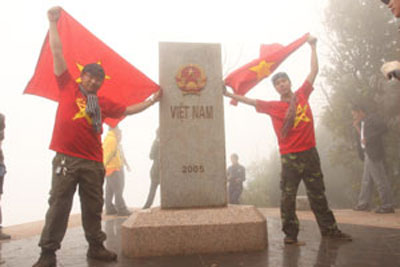A Pa Chai hamlet is well-known to travellers as the westpoint of Viet Nam and a junction between it, Laos and China.

National pride: Group members wave national flags next to Viet Nam's side of the Zero land mark.
Popular with backpackers who want to conquer a farthermost point of Viet Nam and are interested in off-road driving and trekking, the hamlet, located in Muong Nhe District's Sin Thau Commune in the northern mountainous province of Dien Bien, has a growing reputation.
Harbouring an ambition to reach the Zero landmark in A Pa Chai, I left my work behind and joined a group of 17 people for a spontaneous adventure. Before setting off, we contacted soldiers at the Border Guard Station 317 in the hamlet to book rooms and food for our group members, as well as to ask for directions to the boundary stone.
Nguyen Thanh Tung, who often leaves noisy Ha Noi on short trips to remote areas, said: "I always have a great desire to set foot on beautiful Vietnamese places. Have you ever heard of an area where you just stand there and breathe the air of three countries? This thought had haunted me a lot, so I decided to make a trip to A Pa Chai".
We arrived in Dien Bien at around six in the morning. The weather was perfect for a faraway trip, offering a little sunshine and cool air. After we finished our breakfast, nine motorbikes carrying 18 young explorers headed to A Pa Chai, which is more than 250km northwest of the city. The leader assigned my driver and me to ride at the end of the line to take care of everyone.
We didn't face any difficulty in the first 102km from Dien Bien City to Muong Cha District's Si Pha Phin Commune because of the concrete roads. Sometimes, we stopped for a while to take photos or to give us and our motorbikes a rest.
It was expected that we would arrive in the station at five or six in the afternoon. However, the roads from Si Pha Phin to the centre of Muong Nhe District were nowhere near as good as their predecessors and were full of sand and dust.
Along the way the backpackers had unpredictable accidents and drove in the wrong direction which made us arrive at the guard post later than expected. We ate dinner prepared by the soldiers and soon went to bed to get ready for the trek to the Zero landmark the following day.
Vang A Mua, a Mong ethnic man, who joined the army a few months ago, was allocated to guide us to the marker post. It is located on the top of Khoang La San Mountain at 1,864m above sea level. We parked our motorbikes at the foot of the mountain. Women brought bottles of water while men carried food, a coffee pot and any water they could cram into their backpacks.
We were greeted by three high slopes which were a shock to the system considering we didn't do any exercise to warm up our bodies. I've become used to reaching the office on the fourth floor by elevator and I paid for this habit during the hike. I and some female members had to relax after overcoming the first two slopes, while male travellers enjoyed the stunning views. Mua urged us to continue our trip so that we could return swiftly in the afternoon.
I dropped my bottles while climbing the third slope but my leader said: "It is fine, keep moving." Tung pulled me from ahead and another man pushed me from behind. After the slopes, we entered the forest in which the temperature changed. We had to put on more clothes to combat the cold, but the team spirit stayed high as everybody kept encouraging every step.
We approached the peak after three hours. The granite landmark, two-metre high, was completed in 2005. Its three sides were carved with the names and national emblems of each country. We were moved by the significance of reaching our country's border and saluted the national flag. Wearing T-shirts with the Vietnamese flag, we took turns to pose with the landmark and with Mua, the young soldier and expert guide.
Tung, the oldest member in our group, said: "A Pa Chai is one of the most rewarding places to visit. It not only heightens my appreciation of nature's beauty, people and the landmark, but also celebrates sharing and teamwork which has stuck in my mind. In the past, I always felt travelling alone was the best way to discover new things, but after this trip, I realise it is hard to conquer the world by myself."
Mua said it took him just three hours to reach the top and go back, but it took our group over seven.
Reflecting on A Pa Chai, backpackers think of an important border place which is difficult to reach. I totally agree, but will add one more thought: A Pa Chai is also difficult to forget.